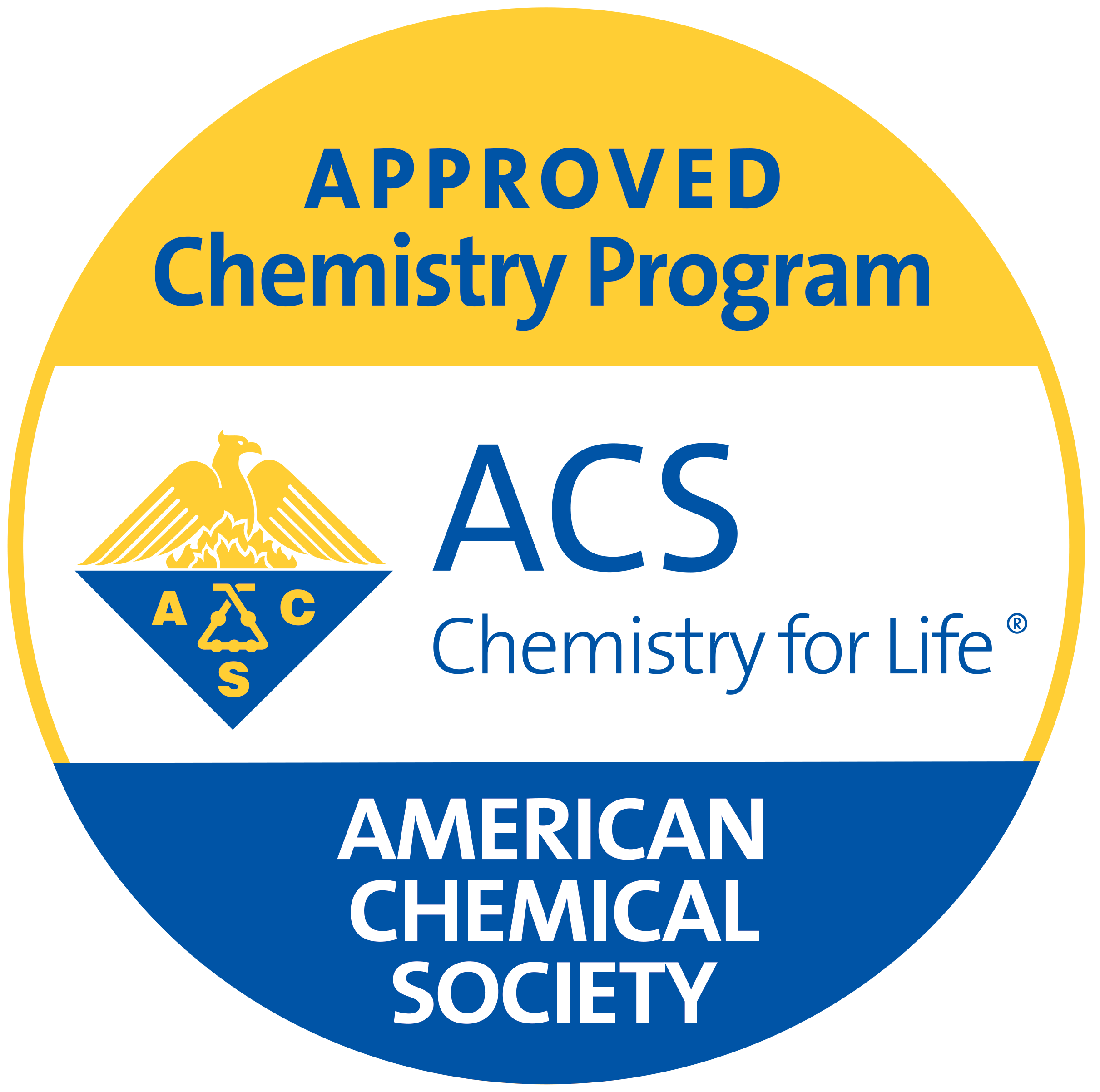Coursework
As discussed on the Curriculum page, your first two years of chemistry study will include the Integrated Chemistry series (CH 142, 143, 144, 145, 242, 243, and 342). This is the sequence taken by most students with POEs in Biology and related areas. In addition, as a chemistry POE, you will take Chemistry Seminar (a one-credit course in the fall of the freshman year designed to expose you to the wide variety of career options available to a chemist), Inorganic Chemistry (a spring course that covers a great deal of the chemistry of the non-carbon elements), and Analytical Chemistry (where you will learn chemical problem solving and quantitative analysis). Rounding out your first two years will be four courses in other departments that provide the necessary background for the upper-level chemistry courses: Calculus 1 and 2, and Introduction to Physics 1 and 2 (Calculus-based Physics).
The next important lecture course is the Physical Chemistry series (CH 352, 354, and 355). In Physical Chemistry the emphasis is on a theoretical understanding of chemical phenomena, and the course involves a great deal of problem-solving. Mathematical equations are derived and then used to explain real-life situations. Employers and graduate schools often look for physical chemistry on transcripts as evidence that a candidate has the necessary experience and ability to understand and apply general principles to specific situations in an exact and quantitative manner. In your junior and senior years, you will also enroll in Chemical Synthesis, Instrumental Methods, and Comprehensive Chemistry, and you will likely enroll in research for course credit. These courses are useful for students preparing for careers in all areas involving experimental laboratory work.
Biochemistry POEs in their first two years of chemistry study will take the Integrated Chemistry series (CH 142, 143, 144, 145, 242, 243, and 342). You will also enroll in CH 247: Bioanalytical Chemistry Laboratory. In addition, as a biochemistry POE, you will take several biology courses during your first two years (BI 105, 121, 122, 106, and 207). You have the option of taking either Chemistry Seminar, offered through the chemistry department in the fall semester, or Biology seminar, offered through the biology department in the spring semester. Like in the chemistry POE, you will also spend your first two years taking courses in other departments that are necessary background for your upper-level courses: Calculus 1 and 2, and Introduction to Physics 1 and 2 (Calculus-based Physics). In your junior and senior years, you will enroll in two more biochemistry courses (CH 418 and BI 316) as well as Physical Chemistry I (CH 352) and Biology Research Methods (BI 380), as well as upper level biology or chemistry electives or laboratory research credits.
Those interested in certification to teach high school chemistry will find an outstanding program at Juniata, not least because we are the home and originators of Science in Motion. However, the Chemistry Education POE is very full and must be designed carefully from the beginning. Students interested in this avenue should contact Dr. Jones (JONES@juniata.edu) in the education department very soon to make sure they are taking the correct courses each semester.
Students interested in Environmental Chemistry will create an individualized POE and should consult with an appropriate advisor as soon as possible. Appropriate advisors for environmental science students are Dr. Yohn (YOHNS@juniata.edu) or anyone in the ESS department.
In addition to completing the required course work, anyone with a chemistry POE must select a member of the department as an advisor. This measure ensures that each student will receive professional guidance in making course choices (in the student's own interest) and also that at least one member of the department will be in a position to write a strong, effective letter of recommendation at a later date.


